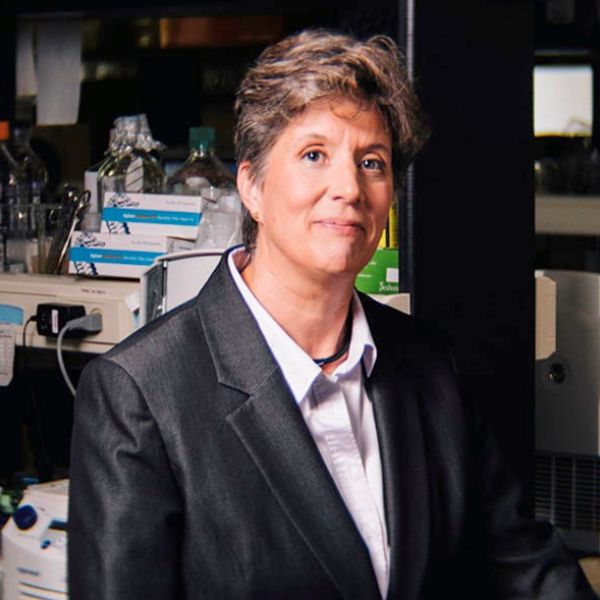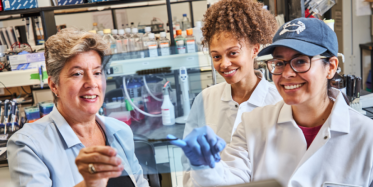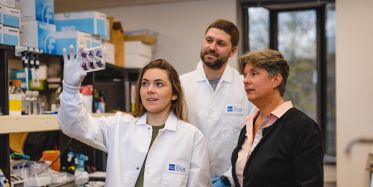Maureen E. Murphy, Ph.D.
-
Deputy Director, Ellen and Ronald Caplan Cancer Center
-
Ira Brind Professor and Program Leader, Molecular and Cellular Oncogenesis Program
-
Associate Vice President for Faculty Affairs
The Murphy laboratory studies the genetics of the p53 tumor suppressor protein. TP53 is the most frequently mutated gene in human cancer. In addition, germline mutations in p53 predispose to Li Fraumeni Syndrome, which is a devastating cancer-predisposition syndrome that affects approximately 1:5000 people in the United States. The Murphy laboratory specifically focuses on genetic variants of p53 that exist in populations with the highest cancer burden of any other group: individuals of of African-decent (P47S and Y107H) and Ashkenazi Jewish descent (G334R). Her work seeks to understand the impact of these genetic variants of p53 on cancer risk and the efficacy of cancer therapy. She also seeks to identify personalized medicine approaches for tumors with these variants. Therefore, her work has direct relevance for improving the cancer prognosis and therapy of individuals of African and Ashkenazi descent. Murphy also studies high grade serous ovarian cancer (HGSOC), and specializes in the impact of p53 mutation on the therapy of this tumor type.
Murphy obtained a B.S. degree in biochemistry at Rutgers University, followed by a doctorate in molecular biology at the University of Pennsylvania School of Medicine. In 1994, she began postdoctoral research at Princeton University in the laboratory of Arnold J. Levine, Ph.D., the co-discoverer of p53. In 1998, Murphy became an Assistant Professor at Fox Chase Cancer Center, where she was promoted to Associate Professor in 2003, and Full Professor in 2011. She joined The Wistar Institute in 2011 and became Program Leader of the Molecular and Cellular Oncogenesis Program in 2012. Murphy is an adjunct professor at Drexel University College of Medicine and The Perelman School of Medicine at the University of Pennsylvania.
The Murphy Laboratory

The Murphy Laboratory
P53 is the most frequently mutated gene in human cancer and is widely regarded as the most important anti-cancer defense protein in the body. The lab studies genetic variants of the p53 gene that exist in individuals of African and Ashkenazi ancestry: these groups have the highest cancer burden of any groups. This work seeks to understand the impact of these genetic variants on the increased cancer burden experienced by these groups. Work in the Murphy lab also seeks to identify novel cancer therapies that are more effective on tumors that contain genetic variants of p53 that exist in African Americans and Ashkenazi Jewish populations in order to offer personalized medicine approaches to these cancers.
-
Predoctoral Fellows
Kaitlyn Casey
Maya Foster
Giulia Pantella
Andrea Valdespino
-
Learn about opportunities at The Wistar Institute here.
Research
THE TUMOR SUPPRESSOR P53
P53 is the most important gene in human cancer. Up to 60 percent of human tumors contain mutations in p53, making it the most frequently mutated gene in human cancer. In addition, germline mutations in p53 cause a syndrome called Li Fraumeni disease where people affected develop multiple tumors of the brain, breast, bone, and adrenal cortex before their second decade of life. Therefore, understanding how to treat tumors with mutant p53, and tumors in individuals with germline variants of p53, has tremendous potential to improve cancer therapy.
Using the unique capabilities of The Wistar Institute Molecular Screening Core, we perform large scale screens for drugs that preferentially kill tumors with mutant p53, or that kill tumors that contain the African variants P47S and Y107H, or the Ashkenazi variant G334R. We have found that we can routinely identify compounds that are preferentially effective in these tumors, compared to tumors that contain wild type (non-mutant) p53. As such, our research seeks to provide hope to individuals from these cancer-risk families.
MUTANT P53 AS A TARGET FOR OVARIAN CANCER
High grade serous ovarian cancer (HGSOC) is a devastating tumor that responds poorly to anti-estrogen receptor therapies. We have discovered that this is because nearly 65% of these tumors contain missense mutations in p53. We find that silencing mutant p53 restores their sensitivity to anti-estrogen receptor therapies. We also study HGSOC that contains a particular mutation in TP53, Y220C. This mutant exists in 6% of HGSOC. We find that combining the Y220C-specific drug Rezatapopt with anti-estrogen receptor therapies like fulvestrant leads to markedly improved therapy of tumors. We are now exploring combinations of other p53-refolding compounds with fulvestrant for this tumor type.
Murphy Lab in the News
Selected Publications
Mutant p53 binds and controls estrogen receptor activity to drive endocrine resistance in ovarian cancer
Shao C, Indeglia A, Foster M, Casey K, Leung J, Modarai SR, Leu JI, Duong B, Mes-Masson AM, Sims-Mourtada J, Auslander N, Drapkin R, Bitler BG, Zhang N, Murphy ME. Mutant p53 binds and controls estrogen receptor activity to drive endocrine resistance in ovarian cancer. Genes Dev. 2025 Nov 5. doi: 10.1101/gad.352953.125. Epub ahead of print. PMID: 41193244.
Targeted citrullination enables p53 binding to non-canonical sites
Indeglia A, Valdespino A, Pantella G, Offley S, Hill C, Foster M, Casey K, Tang HY, Faustino AM, Gardini A, Murphy ME. Targeted citrullination enables p53 binding to non-canonical sites. Mol Cell. 2025 Oct 2;85(19):3588-3604.e11. doi: 10.1016/j.molcel.2025.09.004. PMID: 41043392; PMCID: PMC12671568.
The Ashkenazi-Centric G334R Variant of TP53 is Severely Impaired for Transactivation but Retains Tumor Suppressor Function in a Mouse Model
Stieg DC, Casey K, Karisetty BC, Leu JI, Larkin F, Vogel P, Madzo J, Murphy ME. The Ashkenazi-Centric G334R Variant of TP53 is Severely Impaired for Transactivation but Retains Tumor Suppressor Function in a Mouse Model. Mol Cell Biol. 2024;44(12):607-621. doi: 10.1080/10985549.2024.2421885. Epub 2024 Nov 8. PMID: 39520074; PMCID: PMC11583612.
An African-Specific Variant of TP53 Reveals PADI4 as a Regulator of p53-Mediated Tumor Suppression
Indeglia A, Leung JC, Miller SA, Leu JI, Dougherty JF, Clarke NL, Kirven NA, Shao C, Ke L, Lovell S, Barnoud T, Lu DY, Lin C, Kannan T, Battaile KP, Yang THL, Batista Oliva I, Claiborne DT, Vogel P, Liu L, Liu Q, Nefedova Y, Cassel J, Auslander N, Kossenkov AV, Karanicolas J, Murphy ME. An African-Specific Variant of TP53 Reveals PADI4 as a Regulator of p53-Mediated Tumor Suppression. Cancer Discov. 2023 Jul 7;13(7):1696-1719. doi: 10.1158/2159-8290.CD-22-1315. PMID: 37140445; PMCID: PMC10326602.


